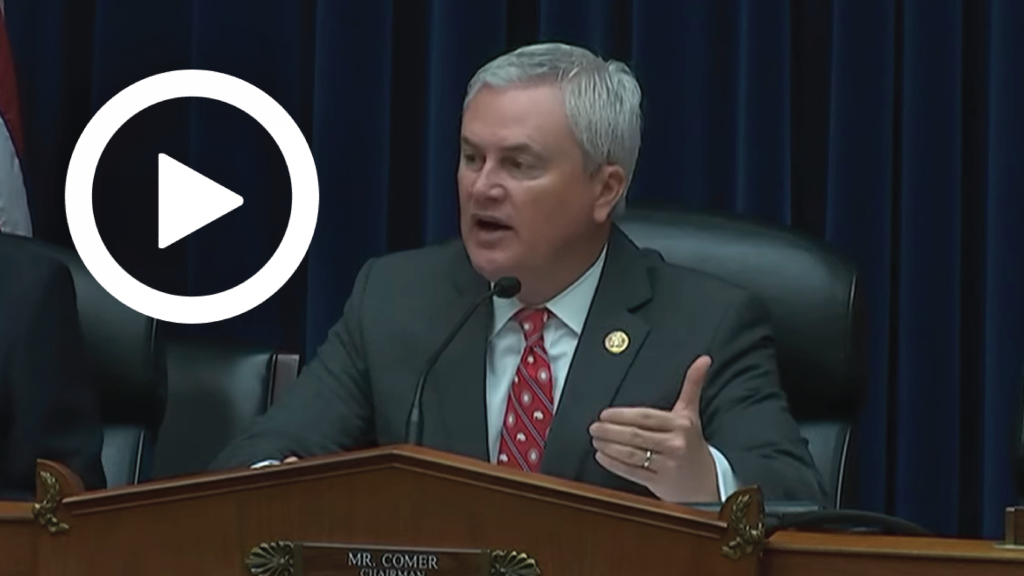Comer: We Must Safeguard Taxpayer Dollars and Combat Waste, Fraud, and Abuse
WASHINGTON – Today, House Committee on Oversight and Accountability Chairman James Comer (R-Ky.) delivered opening remarks at a full committee hearing titled “The Government Accountability Office’s 2023 High Risk List.” In his opening statement, Chairman Comer emphasized that the Government Accountability Office’s (GAO) 2023 High Risk List will assist the committee’s efforts to combat waste, fraud, abuse, and mismanagement in the federal government and safeguard taxpayer dollars. The High Risk List is a critical tool for evaluating whether federal programs are working as designed for the American people. Chairman Comer stressed that federal government programs created and funded by Congress must fulfil their missions, but the GAO has determined that many are bloated, struggle to meet their objectives, and have become vulnerable to serious fraud and waste. To prevent waste and ensure accountability, he concluded that Congress must conduct more oversight, tracking, and data collection to determine how taxpayers’ dollars are being spent.
Today’s hearing is an opportunity for this committee to leverage an important tool in combatting waste, fraud, abuse, and mismanagement while safeguarding taxpayer dollars. That tool is the Government Accountability Office’s 2023 High Risk List.
The 37 areas contained on this list represent programs within the federal government where there is a high risk for fraud, waste, abuse, or mismanagement. The list measures progress and deficiencies so that Congress can take action to conduct meaningful oversight and make those programs more efficient.
Federal government programs created and funded by Congress must fulfil their intended purpose and meet mission objectives while being careful stewards of taxpayer dollars.
Yet too often, massive federal programs struggle to meet their objectives and become vulnerable to fraud and waste.
The High Risk List is a critical tool for evaluating whether the programs created and funded by Congress are working as designed for the American people.
The Government Accountability Office, or GAO, publishes this report at the start of each Congress.
GAO’s High Risk report provides status updates on how programs are performing and recommendations on ways they must improve.
The 37 areas on the list all present either a financial risk of loss of at least $1 Billion taxpayer dollars—that’s billion with a “B”—or a risk involving public health or safety, delivery of essential services to Americans, national security concerns, economic growth, privacy, or the rights of citizens.
Important things are at stake here.
Despite GAO’s best efforts to highlight problems and propose solutions, waste, fraud, and abuse in government is ever present.
GAO has supplied this report to Congress for more than 30 years.
Unfortunately, some programs have appeared on this list since the beginning.
Fortunately, this Committee has returned its attention and resources to focus on its core missions: to ensure government is working for the American people in an efficient manner, to ensure agencies safeguard taxpayer funds from fraudsters and ineligible participants, and to hold leaders accountable when they fail to perform.
This Committee’s very first hearing of the 118th Congress, which included testimony from Comptroller General Dodaro, focused on the rampant waste, fraud, and abuse in COVID relief programs, leading to billions in waste and improper payments with tens of billions of funds going to transnational criminal organizations instead of their intended recipients.
Today, our Committee will also examine the roughly $250 billion lost to waste, fraud, abuse, and mismanagement annually outside of COVID relief programs. This includes:
Improper payments in the Medicaid and National Flood Insurance programs.
Waste due to outdated cybersecurity measures and a lack of preparation for future disasters.
Mismanagement of Department of Defense’s finances and in the Federal Prison System.
All of these programs have been highlighted on the High Risk list.
GAO’s work makes clear: We need to have more oversight, tracking, and data collection to determine how taxpayers’ dollars are being spent.
GAO estimates that just since last Congress’s report, there has already been about $100 billion in federal savings because of improvements to areas included on the previous High-Risk List.
Why is that?
Because effective oversight works.
It works to expose and prevent waste, fraud, and abuse. It works to safeguard taxpayer dollars. And it works for the American people.
We made a commitment in the 118th Congress to restore accountability—not only with this Committee, but the entire House of Representatives. And that’s what we’re here today to do.
I look forward to hearing from Comptroller General Dodaro on the work GAO is doing, and how this Committee can seize opportunities to prevent waste, fraud, abuse, and mismanagement across the government.
And with that, I yield to Ranking Member Raskin for his opening statement.
###
